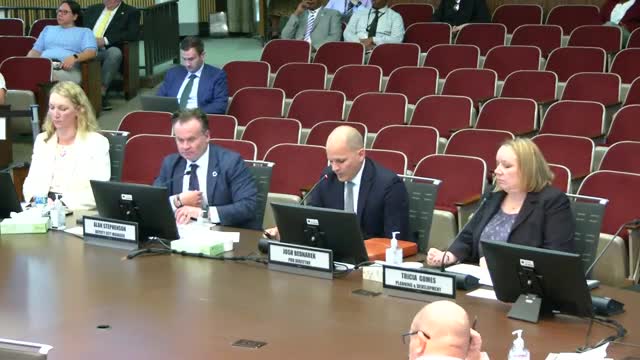Phoenix Council Approves Major Zoning Reforms for Housing
October 08, 2024 | Phoenix, Maricopa County, Arizona
This article was created by AI summarizing key points discussed. AI makes mistakes, so for full details and context, please refer to the video of the full meeting. Please report any errors so we can fix them. Report an error »

In a recent government meeting, city officials highlighted significant advancements in zoning legislation aimed at addressing housing needs and urban development in Phoenix. Over the past five years, the city has approved more than 60,000 dwelling units through rezoning efforts, a testament to the effectiveness of its planning processes and community engagement.
Deputy Director Tricia Gomes presented an overview of four key zoning bills that have recently become law, which include provisions for accessory dwelling units (ADUs), adaptive reuse of commercial buildings, and the introduction of \"missing middle housing\" options such as duplexes and triplexes. These changes are designed to enhance housing availability and affordability, with implementation deadlines set for January 2025 and January 2026 for various components.
House Bill 2720 mandates that cities allow up to three ADUs on qualifying lots, with specific design and setback regulations aimed at maintaining neighborhood character. However, concerns were raised about potential impacts on community dynamics, including increased parking and changes to neighborhood aesthetics due to short-term rentals.
Senate Bill 1162 streamlines the rezoning application process, requiring cities to review applications for completeness within 30 days and to approve or deny them within 180 days. This could limit public input and complicate negotiations between applicants and the community.
House Bill 2297 encourages the adaptive reuse of commercial properties for multifamily housing, stipulating that at least 10% of new units must be affordable. While this aims to revitalize underutilized spaces, it also raises concerns about the potential loss of small-scale commercial buildings and diminished public engagement in development decisions.
The meeting also addressed the upcoming implementation of missing middle housing, which will allow for increased density in residential areas, potentially altering the character of neighborhoods predominantly composed of single-family homes.
As the city moves forward with these legislative changes, officials are set to provide further updates and seek community input in upcoming planning commission meetings scheduled for October and November. The council remains committed to balancing development needs with community interests as Phoenix continues to evolve.
Deputy Director Tricia Gomes presented an overview of four key zoning bills that have recently become law, which include provisions for accessory dwelling units (ADUs), adaptive reuse of commercial buildings, and the introduction of \"missing middle housing\" options such as duplexes and triplexes. These changes are designed to enhance housing availability and affordability, with implementation deadlines set for January 2025 and January 2026 for various components.
House Bill 2720 mandates that cities allow up to three ADUs on qualifying lots, with specific design and setback regulations aimed at maintaining neighborhood character. However, concerns were raised about potential impacts on community dynamics, including increased parking and changes to neighborhood aesthetics due to short-term rentals.
Senate Bill 1162 streamlines the rezoning application process, requiring cities to review applications for completeness within 30 days and to approve or deny them within 180 days. This could limit public input and complicate negotiations between applicants and the community.
House Bill 2297 encourages the adaptive reuse of commercial properties for multifamily housing, stipulating that at least 10% of new units must be affordable. While this aims to revitalize underutilized spaces, it also raises concerns about the potential loss of small-scale commercial buildings and diminished public engagement in development decisions.
The meeting also addressed the upcoming implementation of missing middle housing, which will allow for increased density in residential areas, potentially altering the character of neighborhoods predominantly composed of single-family homes.
As the city moves forward with these legislative changes, officials are set to provide further updates and seek community input in upcoming planning commission meetings scheduled for October and November. The council remains committed to balancing development needs with community interests as Phoenix continues to evolve.
View full meeting
This article is based on a recent meeting—watch the full video and explore the complete transcript for deeper insights into the discussion.
View full meeting
